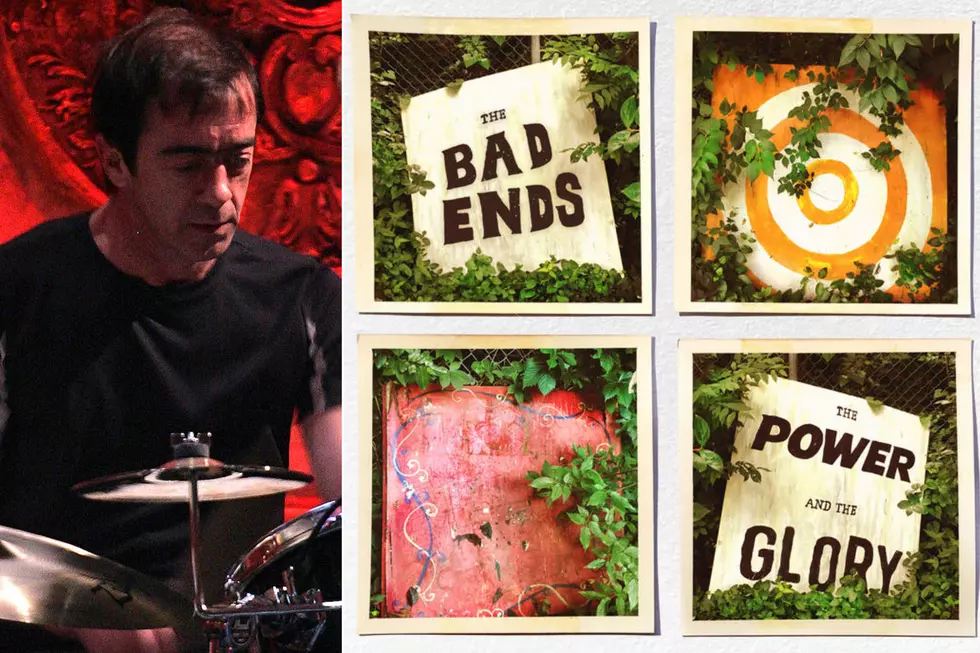
Shakers and Saxophones Get Thrown Into R.E.M.’s ‘Fireplace’
R.E.M.'s second album, 1984’s Reckoning, carried a curious phrase on the LP’s spine: "File Under Water." It was a designation, an in-joke or even an alternate title that referenced the running theme of water in the album's lyrics, from "Seven Chinese brothers swallowing the ocean" to "These rivers of suggestion are driving me away."
When R.E.M. released their first best-of collection, 1988’s Eponymous, the compilation had a different designation: "File Under Grain." This time, it was a reference to the wheat field cover art as well as the subject matter of the LP's lone single, "Talk About the Passion," which was about hunger.
A few years, and albums, after Reckoning, and about a year before Eponymous hit stores, R.E.M. repeated this exercise. Lead singer and primary lyricist Michael Stipe had noticed that many of the songs that made up the band’s fifth studio album, Document, featured fire – from burning coals in "Exhuming McCarthy" and fiery destruction in "Welcome to the Occupation" to a firehouse in "Oddfellows Local 151" and a literal chorus of "Fire!" in "The One I Love." When released in the summer of 1987, Document had "File Under Fire" inscribed on its spine.
The most obvious instance of this theme was in the second song on side two, "Fireplace." Like the song that preceded it on the album, "The One I Love," the track both contained a connection to fire and the use of repetition by Stipe. Where "The One I Love" replicated the same verse three times, but switched out a word in the last reiteration to emphasize a nasty cycle ("A simple prop" became "Another prop"), "Fireplace" changed the last line of its chorus each time to depict escalation.
The first time around, the floor is cleared to "sweep the rug into the fireplace." Next time, they "sweep the floor into the fireplace." Before long, it's "throw the chairs into the fireplace" and then, finally, "throw the walls into the fireplace." What begins with, seemingly, the burning of dust and crumbs, ends with the destruction of the structure that the fireplace is meant to make habitable. Fire and brimstone, indeed.
As it turns out, "Fireplace" has a significant religious connection. According to many R.E.M. biographies, Stipe's lyrical inspiration for the song was a speech given in the eighteenth century by Mother Ann Lee, the leader of the first American chapter of the Shakers. Before she became known as Mother Ann, Lee joined this religious sect – also known as the Shakin’ Quakers because of their dancing method of worship – in her native England, where she was persecuted for her beliefs. These included that the second coming of Jesus Christ was imminent, adherence to a life of simplicity and, perhaps most radical among Christian religions, that celibacy was a preferred lifestyle.
After being treated violently and locked up repeatedly in Britain, Mother Ann sailed with eight followers to the American colonies, a couple of years before the Declaration of Independence, with the idea of gaining religious freedom. Settling north of Albany, N.Y., the Shakers began to believe that Mother Ann was Jesus Christ in female form – essentially the "second coming." She and her followers encountered more violence and imprisonment when they tried to spread the Shakers' worship into New England. Nevertheless, new chapters of the sect were established in the wake of the Revolutionary War and Mother Ann's death in 1784. Their membership was damaged by the practice of celibacy and the Shakers dwindled over the last couple of hundred years, although one, two-person chapter continues in the 21st century in Maine.
Despite the Shakers' extreme reaction to a civilization that they felt was out of control (perhaps reflected in Stipe's recitation of "Crazy, crazy world / Crazy, crazy times"), the sect is mostly known today for their simple, strong craftsmanship of furniture and their love of dancing and movement as a method of worship. Each shaker home had hooks mounted on the wall, on which their chairs could be hung. This would allow for a strict cleaning of the floor, as well as make room for dancing.
Listen to R.E.M.'s 'Fireplace'
Both of these elements are represented in the chorus of the R.E.M. song: "Hang up your chairs to better sweep / Clear the floor to dance." Eventually, of course, everything including the floor, chairs and walls ends up in the fireplace. Given the other political content on Document, it's likely that Stipe was making some sort of modern connection to Mother Ann Lee. "Fireplace" could be a cautionary tale that righteous anger of any kind can slowly consume the necessary structures.
Stipe's cryptic lyrics were matched by the strange, sharp instrumentation, which includes an off-kilter beat from drummer Bill Berry. In a review for The New York Times, Jon Pareles called "Fireplace" a "hard-rock waltz with a modal, hypnotic riff." Peter Buck, the guitarist responsible for the riff, explained that R.E.M. was hoping for weirder results when making Document.
"This time around we wanted to make a tougher-edged record," he told Rolling Stone in 1987. "[Predecessor] Lifes Rich Pageant was kind of like the Bryan Adams records – I really liked the record, but it was very direct in a lot of ways. This time we wanted to make a loose, weird, semi-live-in-the-studio album. We wanted to have a little tougher stance."
Part of the loose, weird approach was provided by saxophonist Steve Berlin, most famous as a member of Los Lobos – although he also worked with the Replacements, the Go-Go's and Faith No More. Co-producer Scott Litt had previously teamed with Berlin and brought him in near the end of the Document sessions. His midnight sax took the place of a typical Buck guitar solo, lending "Fireplace" a jazzy edge, as it finished off the song in an explosion of freewheeling bebop honking. Never before had an outside musician been given such a prominent role on a R.E.M. LP.
"That one was obviously a big one because R.E.M. were pretty huge," Berlin told the A.V. Club in 2012. "I was a little nervous going into that field, but it was a lot of fun. Even though they'd been successful, they were still experimenting. They were having a lot of fun making that record. The vibe in that room was they were really having a great time. They were happy with the way they were sounding and how the record was going and the way the world was receiving them. It was just a real honor to be a part of it."
The guys in R.E.M. must not have thought that "Fireplace" was much good without Berlin's presence. The band only performed the song 10 times in concert in their entire career, the final instance coming in 1989. "Fireplace" remains a stranger, lesser-known entry in the R.E.M. canon, although – as with the Shakers – the workmanship is rock solid.
Top 100 '80s Rock Albums
More From Ultimate Classic Rock










